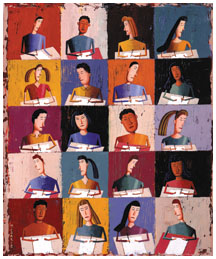
|
February 13, 2008: On the Campus
(Illustration: Martin Jarrie; photos: Hyunseok Shim ’08) |
Making the grade(s)
 By Melinda Baldwin GS
By Melinda Baldwin GS
At 5 p.m. on Tuesday, Jan. 15, undergraduates breathed a sigh of relief as they handed in their papers and essays for the fall semester. For most students, Dean’s Date — the final deadline for written assignments — meant freedom from those pesky research papers and a brief chance to catch their breath before finals began.
Dean’s Date, however, had a far different meaning for another set of Princeton students. For graduate student preceptors, it meant a mountain of assignments that had to be read and marked before final grades were due at the end of the month.
Dael Norwood, a history preceptor, estimated that he would spend about 20 hours in January grading papers and exams for the 11 students in his precept — almost two hours per student.
“From our perspective, we’re just slammed with all of these papers to read,” said Susan Robison, a preceptor in the psychology department.
To add a little cheer to the grading ritual, Robison organized a Dean’s Date grading party on Jan. 17. Preceptors braved the wintry night to gather in the Butler community room, where they ate snacks, offered sympathy to swamped colleagues, and began their January grading.
Graduate students often turn to their fellow preceptors for support and advice when grading challenges arise. Last December Alice Hsiaw sat down with other graders from the economics department to discuss their students’ junior-paper prospectuses. By comparing notes, Hsiaw said, the group was able to get a better sense of whether they were grading their students fairly.
“Sometimes graduate students have a hard time remembering what they did and didn’t know” as undergraduates, Hsiaw said. “It can be difficult to know whether they are expecting too much or too little of their students.”
Norwood added that “after reading a student’s paper over a few times, the temptation is to mentally fill in the blanks in their work. You start thinking they’re saying more than they are.”
Of course, tales of the heavy January workload for preceptors are unlikely to inspire much sympathy in the undergraduates whose work they are grading. One of Robison’s students penciled in a question of his own for the person reading his exam: “Why is this final so long?!”
 By Chip McCorkle ’09
By Chip McCorkle ’09
One Princeton grading policy that engendered student criticism long before grade deflation is the option to take courses on a Pass/D/Fail (“P/D/F”) basis.
Once a semester for no more than four semesters, students can ask professors to give their cumulative coursework one of the three grades. Some students inevitably find themselves doing well enough to want to switch out of the P/D/F option; they can do so up until the ninth week of class — a deadline that students have intermittently denounced and tried to extend over the past several years.
But now the debate is shifting: Some student leaders worry that the P/D/F option itself is under threat.
Professors have the authority to bar students from taking their courses on a P/D/F scale, and a study last spring by Jonathan Elist ’07 estimated that 40 percent of course offerings did not offer the option. Behind the increase, say professors, is a concern that students don’t try very hard in classes they’re taking P/D/F, and thus contribute less to the course than regularly graded students do.
“I do think that a majority of students who start out taking a course P/D/F begin to keep their efforts toward the course on a very, very low simmer starting around week four of the course,” said assistant English professor Zahid Chaudhary in an e-mail.
Associate philosophy professor Adam Elga ’96 added that No-P/D/F courses can gain “energy” and “momentum” from having more students who are “extremely motivated and ‘into’ the class.”
But students say this neglects the thinking behind the P/D/F option, which is that it allows students to take the intellectual risks they might shy away from under normal grading.
To counter the tide of No-P/D/F courses, the USG Academics Committee, led by Sarah Breslow ’08, is pushing for the issue to be considered by the Committee on the Course of Study, the joint student-faculty group that oversees the undergraduate curriculum.
Dean of the College Nancy Weiss Malkiel, chairwoman of the committee,
has indicated that the issue will get a serious look by the group this
spring or next year. “We need to think carefully about what needs
to be done [or] could be done to shore up the P/D/F option,” Malkiel
said.![]()

To read our exclusively online On the Campus column, click here.
